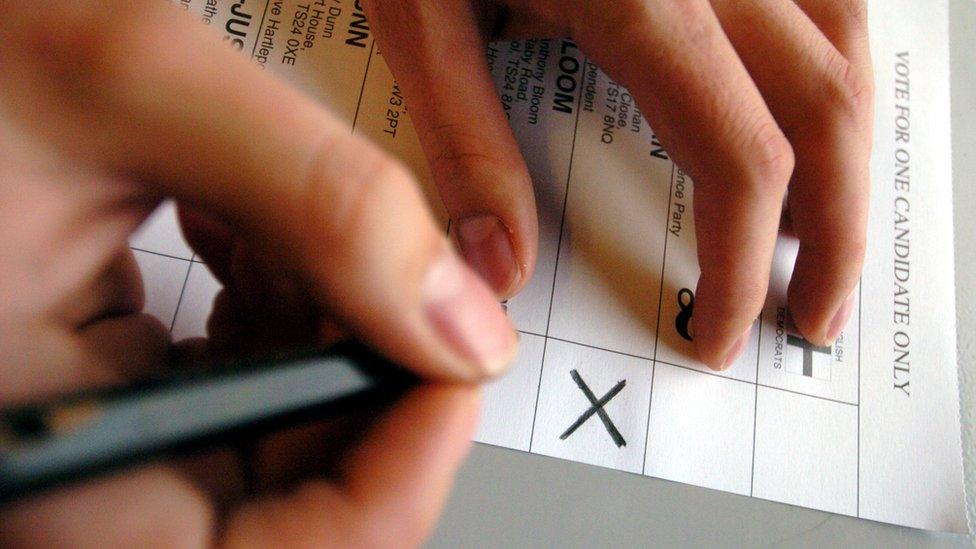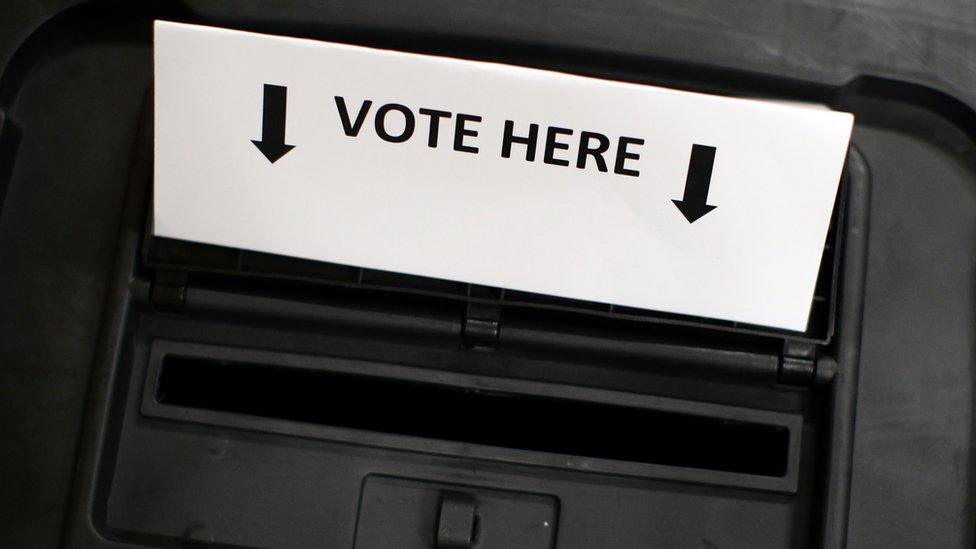To poll or not to poll? That is still the question
- Published

Anyone watching Parliament this week would have been left in little doubt that ministers want the local elections in England to take place as planned in early May.
Cabinet Office Minister Chloe Smith told MPs that while the date is officially under review, she's not in favour of delay, saying voters have a right to be heard and the bar for moving the poll is "very high".
But that's unlikely to be the end of the story.
In some quarters of local government, there is a growing push for postponement, not least from some Conservative councillors who've been setting out their concerns and urging the government to make an early call.
These are a significant and complex set of elections which - depending where you live - could determine who runs your council, who oversees your police force or who is your decision-making mayor.
As well as the votes already planned for this year, the polls that were postponed from last year are due to take place in May, making this a big set of elections - and a crucial test for political parties.
Few in local government welcome the idea of delaying such an important democratic exercise, but some are now saying it's the most practical option.
Even if we get them open we'll have to deep clean the dust and spiders before start making them Covid-safe.
I've been shown a summary of concerns set out by returning officers - council officials who are responsible for running the elections.
Key among them are the availability of safe venues for ballots to be cast and counted, and finding enough willing staff to take on public-facing roles with back-up plans for any Covid outbreaks.
Typical polling stations, such as village halls and community centres, have in many cases been closed for the best part of a year.
One council leader said they were struggling to get hold of the people who manage them, adding: "Even if we get them open we'll have to deep clean the dust and spiders before we even start making them Covid-safe."

What elections are due to take place on 6 May?
Local council elections in England
Local and combined authority mayoral elections
Mayor of London and London Assembly elections
Police and crime commissioner elections in England and Wales
Welsh parliamentary elections
Scottish parliamentary elections
Police and crime commissioner, council and mayoral elections had been due to take place in 2020 but were postponed due to Covid.

Another questioned how many sports halls would be needed for socially-distant ballot box counts.
In several places the expectation is, if the elections go ahead, it will take a few days to count the votes, perhaps even over the weekend after the Thursday poll.
Nicholas Rushton, the Conservative leader of Leicestershire County Council, thinks a delay until autumn would be sensible, saying: "The health of the public and candidates outweighs the need to vote."
He added: "People are saying to me, 'we've got enough on our plates at the moment dealing with the pandemic, without having to deal with the election'."
'Tricky on every level'
That's a view echoed elsewhere. Councils have taken on some crucial roles during this pandemic, from supporting the most vulnerable to helping test and trace efforts, and resources are thin.
The Cabinet Office said it's been working closely with electoral teams and public health bodies to put a strong set of measures in place to make the elections safe, pointing to the fact polls have happened elsewhere during the pandemic.
One local election official told me they had been offered support by government and were confident they could address the practicalities, but added: "It is tricky on every level."
What's worrying some is the impact on campaigning, public confidence and turnout.
Traditional door-to-door canvassing and leafleting is likely to be curtailed for fear of spreading the virus, with an increased focus on digital campaigns.
Councillor John Fuller, leader of South Norfolk Council and chairman of the District Councils Network, advocates a delay until early summer or autumn, saying there's more to an election than placing an 'X' in the box.
"Elections should be informed and opportunities for candidates to meet the electorate," he said.
"With so many elections, and candidates in a series of local and regional races, effectively subcontracting the campaign to Twitter or Facebook isn't the sort of election that anyone should welcome."

It isn't a universal view. One senior local government figure said the May date was a viable option given the time there's been to prepare, adding there should be no "delay to democracy" unless there was absolutely no way to avoid it.
Steve Rotheram, the Labour Mayor of the Liverpool City Region, said elections had taken place safely around the world.
He said: "The government should be putting every conceivable measure in place to ensure that this May's elections can run as safely and smoothly as possible - including a mass campaign to encourage postal voting.
"People deserve clarity, so at a later date, should government plans change, it should say so as soon as possible before money is wasted in preparation for something that won't take place."
The Cabinet Office, clear that preparations are already well underway, pointed out the government's plans to vaccinate the most vulnerable at pace, as well as options for postal and proxy votes, with additional measures expected to be put in place for those who can't make it to a polling station.
But one Conservative council leader is still convinced ministers will budge, saying their position was "more crumbly" after a blunt call this week in which some local authorities made clear their concerns.
"I wouldn't rule out an announcement soon," they said, adding: "For the sake of clarity we need a decision sooner rather than later."
The government has made clear it's working to the May date - unless the pandemic or the vaccine roll out takes an unpredictable turn.
With that in mind, councils are pressing on with plans. But they're definitely not printing the ballot papers just yet.